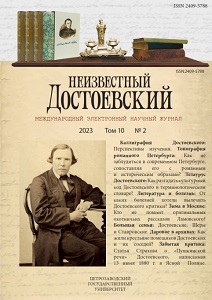Даровое Достоевского в архивных документах Русского географического общества
Dostoevsky’s Darovoe in Archival Documents of the Russian Geographical Society
Author(s): Albina Stanislavovna BessonovaSubject(s): Local History / Microhistory, Russian Literature, 19th Century
Published by: Петрозаводский государственный университет
Keywords: F. M. Dostoevsky; early biography of the writer; Darovoe estate; Kashirsky district of Tula province; Russian Geographical Society; archive; ethnographic description;Russian people;Monogarovo village;
Summary/Abstract: The summer months of 1832–1836, spent by F. M. Dostoevsky as a child in his parents’ Darovoe estate in the Kashirsky district of Tula province, left, by the writer's own admission, “the deepest and strongest impression for the rest of his life.” One of these impressions is the way of life, traditions, and character of the Russian people. The Russian Geographical Society (RGO) archive document “Information About the Ordinary Russian People of Tula Province in Kashirsky District”, compiled by the priest of the Holy Dukhovsky church of Monogarovo village P. V. Proferansov (1849), contains an ethnographic description of the peasants of the villages of Monogarovo, Darovoe, Cheremoshnya, Komovo, Nazar’yevo — parish of the Holy Dukhovsky temple. These documentary data provide an idea not only about the appearance, language, dwelling, rituals and traditions of the people, but also about the national character, as the future writer learned it in his youth. The introduction into scientific circulation of new materials on the history of the Dostoevskys’ Darovoe estate will allow us to more comprehensively present the circumstances of the formation of the character and worldview of the writer. Consideration of the archival materials of the Russian Geographical Society in the context of the “folk” idea of F. M. Dostoevsky, formulated by him in the “A Writer’s Diary”, testifies to the objectivity of his position in the “folk” question and the undoubted influence of early impressions of rural childhood on the ideological and artistic structure of works.
Journal: Неизвестный Достоевский
- Issue Year: 10/2023
- Issue No: 2
- Page Range: 196-223
- Page Count: 28
- Language: Russian

